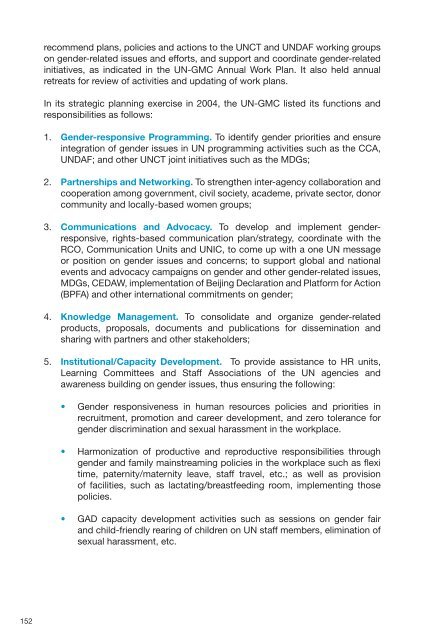Section 3 - Educating and Partnering for CEDAW
Section 3 - Educating and Partnering for CEDAW
Section 3 - Educating and Partnering for CEDAW
Create successful ePaper yourself
Turn your PDF publications into a flip-book with our unique Google optimized e-Paper software.
ecommend plans, policies <strong>and</strong> actions to the UNCT <strong>and</strong> UNDAF working groups<br />
on gender-related issues <strong>and</strong> ef<strong>for</strong>ts, <strong>and</strong> support <strong>and</strong> coordinate gender-related<br />
initiatives, as indicated in the UN-GMC Annual Work Plan. It also held annual<br />
retreats <strong>for</strong> review of activities <strong>and</strong> updating of work plans.<br />
In its strategic planning exercise in 2004, the UN-GMC listed its functions <strong>and</strong><br />
responsibilities as follows:<br />
1. Gender-responsive Programming. To identify gender priorities <strong>and</strong> ensure<br />
integration of gender issues in UN programming activities such as the CCA,<br />
UNDAF; <strong>and</strong> other UNCT joint initiatives such as the MDGs;<br />
2. Partnerships <strong>and</strong> Networking. To strengthen inter-agency collaboration <strong>and</strong><br />
cooperation among government, civil society, academe, private sector, donor<br />
community <strong>and</strong> locally-based women groups;<br />
3. Communications <strong>and</strong> Advocacy. To develop <strong>and</strong> implement genderresponsive,<br />
rights-based communication plan/strategy, coordinate with the<br />
RCO, Communication Units <strong>and</strong> UNIC, to come up with a one UN message<br />
or position on gender issues <strong>and</strong> concerns; to support global <strong>and</strong> national<br />
events <strong>and</strong> advocacy campaigns on gender <strong>and</strong> other gender-related issues,<br />
MDGs, <strong>CEDAW</strong>, implementation of Beijing Declaration <strong>and</strong> Plat<strong>for</strong>m <strong>for</strong> Action<br />
(BPFA) <strong>and</strong> other international commitments on gender;<br />
4. Knowledge Management. To consolidate <strong>and</strong> organize gender-related<br />
products, proposals, documents <strong>and</strong> publications <strong>for</strong> dissemination <strong>and</strong><br />
sharing with partners <strong>and</strong> other stakeholders;<br />
5. Institutional/Capacity Development. To provide assistance to HR units,<br />
Learning Committees <strong>and</strong> Staff Associations of the UN agencies <strong>and</strong><br />
awareness building on gender issues, thus ensuring the following:<br />
• Gender responsiveness in human resources policies <strong>and</strong> priorities in<br />
recruitment, promotion <strong>and</strong> career development, <strong>and</strong> zero tolerance <strong>for</strong><br />
gender discrimination <strong>and</strong> sexual harassment in the workplace.<br />
• Harmonization of productive <strong>and</strong> reproductive responsibilities through<br />
gender <strong>and</strong> family mainstreaming policies in the workplace such as flexi<br />
time, paternity/maternity leave, staff travel, etc.; as well as provision<br />
of facilities, such as lactating/breastfeeding room, implementing those<br />
policies.<br />
• GAD capacity development activities such as sessions on gender fair<br />
<strong>and</strong> child-friendly rearing of children on UN staff members, elimination of<br />
sexual harassment, etc.<br />
152

















